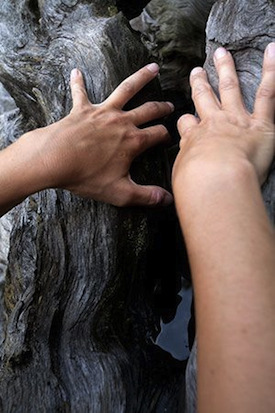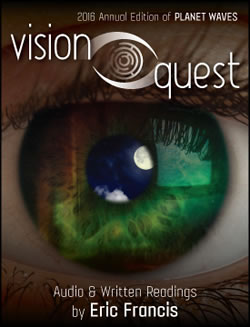by Alison Beth Levy
Ten years ago, at age 26, I initiated a search for my birth parents — a process many adoptees undertake to clarify their identity. Maybe it was a diffusing Neptune transit that set a timer off for me to reclaim myself, or perhaps I was induced by earth-shaking Pluto to make deeper inner discoveries, but it was definitely Uranus that pulled the rug out from under me in a bone-rattling awakening.

Photo by Eric Francis
During this time, I began to understand the mind-body-spirit connection, rekindle my previous teenage love of astrology, and discover much about the effects of my early life on my challenging emotions — and take responsibility for them. Ten years later, I can look back with gratitude on many adventures I had in my pursuit of finding my place in this world as an adoptee.
The first thing I discovered, via my Michigan adoption agency’s records, was that no one was expecting my birth — not even my mother. At the time of her pregnancy, my birth mother, a 26-year-old professional musician and Orthodox Jew, was being medicated for schizophrenia. I was born one night at home, brought to the hospital and then to the Jewish adoption agency. Due to my mother’s state, her mother made the decision for my adoption.
Because my birth mother had signed my adoption papers I was able to get her name and family info after I applied for and received the written report from the agency. Many adoptees can’t lawfully receive actual contact information, and it causes them much grief not to have a way to find their blood family. Fortunately, there is a social rights movement in the United States to overturn the withholding of “identifying information.”
Upon requesting my birth mother’s contact info, I was told that she had already passed. Thankfully, however, I was put in touch with one of her brothers. Speaking to my uncle for the first time and learning about my birth mother was one of the happiest moments of my life.
Most people take knowledge of their blood relatives for granted. For this reason, it is hard to understand an adoptee’s struggle with disconnection and separation. Many adoptees report painful emotions resulting from not knowing where they come from. They might feel that they lack a sense of self, or that they are not accepted by or fit in with their adopted family. There is an unconscious wound of separation from the birth parents. Actor, playwright and poet Rock Wilk reveals how adoptees navigate the question of blood-relations in his solo theatrical play, Broke Wide Open.
In popular culture, adoption is still seen as “happily ever-after” for the adopted baby because it is assumed that once the adopted baby has a new home everything will be fine. At the core of the adoptee’s complex pursuit for identity and blood ancestry is the original separation from birth mother, known as the “Primal Wound.” For me it feels like a void, a very dark empty space that exists beneath depression, anxiety and loneliness.
Experts in the adoption field note the unconscious, unhealed pain that reveals itself in an adoptee’s childhood and adolescence. Many adopting parents aren’t sufficiently prepared by adoption agencies. Adoption is shrouded in many provocative and sensitive issues that keep dialog at bay: loss, abandonment, death, mental illness, family secrets, hidden and teenage pregnancy, religious beliefs and identity issues.
Each step of the search takes emotional stamina to prepare for failure, or for disappointing or painful information. The next stage of my quest involved getting my birth father’s information from the state agency, with only a first name (which was incorrect) and first letter of his last name.
Thanks to a few miracles — namely a search angel’s advice and a retiring state agent — I received my birth father’s real name, age (91!), and place of residence (still alive!). I decided to write him a letter. When I didn’t hear back in a few months, I left a few messages at the front desk of his apartment complex, again with no response from anyone. I considered taking the huge risk and just arriving on his doorstep but decided to let it go.
About this time, my personal journey became clear to me with the support of healer Kiana Love. I needed to heal the parts of me that didn’t feel safe in this world, and slow down in order to nurture myself. I began to crave a deeper connection to nature and spirit, sources of peace and solace for me.
Things happened quickly after my realizations. After an eclipse and an Ayahuasca ceremony, I moved from New York City to New England to work at an off-the-grid retreat center steeped in indigenous wisdom. I joined Katja Esser’s program in the West-African Dagera tradition with an ancestor foundation. I loved the woods, meadows, fresh air, new people, plants and creatures, and the festivals and events we hosted. I was opening up to a new world.
One evening I got an email entitled, “your birth father,” from a friend of my birth father who had found my written letter upon his move into a nursing home. She sent lengthy emails about him and we talked on the phone about his amazing story.
Born in Eastern Europe, he was the sole Holocaust survivor of his family. He was seized as a young man and held for 30 years in Siberia, kept for a long time for his veterinary skills.
Shortly after being in touch with this angel woman, a prominent African wisdom teacher named Malidoma Some came to the retreat center and taught an ancestor workshop culminating in an ancestor fire ritual. Malidoma told me that in his culture orphans are seen as God’s children, and no one can harm them.
After this powerful experience, I had the courage to fly to California to meet my birth father. I was asked not to tell him who I was due to his PTSD. The day I saw him he wasn’t feeling well but I got to spend some time with him under a “hidden identity.” I’m grateful to have held his hand and looked into his eyes, since he passed away a few months later.
In my research on innovative help for adoptees I found the work of Craig S. Hyman, an adoptee with a long history in the field. His aim is to heal adoptees and educate the public in order to change the ‘happily ever after’ adoption myth. Out of his years of ‘trying everything’ to heal his own adoptee pain, he created a program of the processes that worked for him.
Inside Out — The Expressive Arts Adoption Healing Seminar offers light spiritual and art therapy exercises as well as adoption constellation work like role play, etc. In this program one feels, processes and releases trauma while supported and nurtured in a “safe place” amongst caring peers. Hyman says, “The damage is done. What really helps is to release in a safe place and get out what you want to say to someone. Hearing your own voice is better than just hearing it in your head.”
Hyman also calls for more education so that adoption workers can help with adoptees’ genealogical bewilderment and affirm their reality of loss.
For me, astrology has been a tool that has helped me to affirm the reality of my loss, and to understand my life. By symbolically mapping the cosmos in a birth chart, astrologers can profoundly validate one’s life story, give meaning to confusion and reveal untapped strengths. The adoptee wound affects self-image, and relationships of all types. Astrology directly speaks to these significant realms of life. Astrological research on adoptee and foster care charts would greatly serve adoptees and their families.
In comparing our astrology charts, I can see my connection to my birth parents and my adopted parents. In my chart I see that I came into this life to experience my adoptee journey, longing for identity and a place in this world, and a desire to assist others who feel fragmented as well.
Adoptees are physically and psychologically abandoned. Yet so many people living today were abandoned as children in some way or feel like their family’s black sheep, alienated from their family of origin, abandoned by their own blood. A bunch of bastards are we! We are a people cut off from our roots. As Stephen Jenkinson of Orphan Wisdom writes:
“Orphans are not people who have no parents: they are people who don’t know their parents, who cannot go to them. Ours is a culture built upon the ruthless foundation of mass migration, but it is more so now a culture of people unable to say who their people are. In that way we are, relentlessly, orphans.”
As a culture we are collectively paralyzed. I feel that this stems from an unacknowledged and unhealed disconnection from global family, something I am well aware of as an adoptee. To make vital change in our world, to flourish as humanity, we need new stories and myths that empower us all. These new myths will encourage our individual identities as well as galvanize our collective origins.
Alison Beth Levy of Starry Blessings Astrology develops helpful contemporary approaches to astrology. She recently moved to Rosendale, NY, with her partner, and in January 2015 they are hosting Craig S. Hyman’s upcoming adoption healing seminar.


Love this Alison! So touching to hear your story. You are such a courageous, vulnerable, profoundly beautiful soul and it’s an honor to know you. Bowing deeply to your courage and your light. Love you!
Aw, Christina! Thank you. It is so alchemizing to share our stories.
Alison! I’m so happy I stumbled upon your story here! I appreciate the honesty and vulnerability with which you shared it. Thank you for your courage, for sharing yourself and your healing process. You’re an inspiration! Sending you love and deep embrace.
Thanks Dhana, so happy for your appreciation. Warmth and blessings to you 🙂